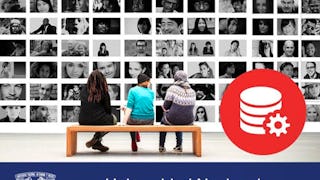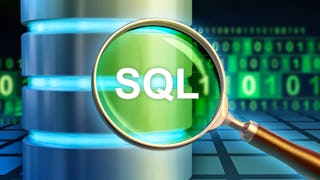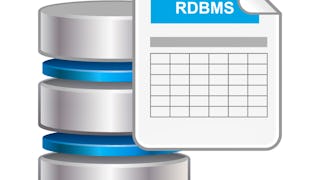In today's data-driven world, the ability to work with relational databases is an essential skill for professionals in various fields. This course is designed to equip you with the knowledge and practical skills needed to become proficient in database management and application development. Whether you are pursuing a career as a database administrator, software developer, or data analyst, this course provides you with a strong foundation to excel in your chosen field.



Relational Database Implementation and Applications
Ce cours fait partie de plusieurs programmes.


Instructeurs : Gerald Balekaki
Inclus avec 
(27 avis)
Expérience recommandée
Ce que vous apprendrez
Implement relational database and usage of indexes, views, triggers, temporary tables, functions, and stored procedures.
Develop database-driven applications using programming languages, such as Java, Python or C/C++ and frameworks.
Describe transaction and concurrency control concepts in relational databases.
Compétences que vous acquerrez
- Catégorie : SQL
- Catégorie : MySQL
- Catégorie : Java
- Catégorie : Database Development
- Catégorie : Data Structures
- Catégorie : Transaction Processing
- Catégorie : Stored Procedure
- Catégorie : Database Management
- Catégorie : Performance Tuning
- Catégorie : Relational Databases
- Catégorie : Database Design
- Catégorie : Data Integrity
Détails à connaître

Ajouter à votre profil LinkedIn
Découvrez comment les employés des entreprises prestigieuses maîtrisent des compétences recherchées

Élaborez votre expertise du sujet
- Apprenez de nouveaux concepts auprès d'experts du secteur
- Acquérez une compréhension de base d'un sujet ou d'un outil
- Développez des compétences professionnelles avec des projets pratiques
- Obtenez un certificat professionnel partageable

Il y a 7 modules dans ce cours
Welcome to Relational Database Implementation and Applications! In Module 1 of this course, you'll delve into the fundamental aspects of building relational databases. You'll learn about implementing indexes, views, triggers, functions, and stored procedures in relational databases. We'll highlight the significance of these elements in databases and how they enhance query performance. You'll explore the creation of both simple and complex views, understanding how they offer data abstraction benefits and the versatility of managing data through views. Additionally, you'll gain experience in creating and optimizing database operations using user-defined functions, triggers, and stored procedures in SQL, thus acquiring comprehensive knowledge of accurate business logic implementation and performance optimization techniques.
Inclus
5 vidéos10 lectures2 devoirs1 sujet de discussion1 laboratoire non noté
Module 2 of this course offers an immersive exploration of the powerful world of SQL window functions and OLAP (Online Analytical Processing) concepts. You will learn about the definition and benefits of window functions, gaining proficiency in advanced applications such as RANK(), DENSE_RANK(), LEAD(), LAG(), NTILE(n), PERCENT_RANK(), and CUME_DIST(). Additionally, you'll develop the skills to control window function behavior using PARTITION BY and ORDER BY clauses, define custom window frames with RANGE and ROWS clauses, and design, query, and analyze OLAP datasets using ROLL-UP and DRILL-DOWN levels of aggregation.
Inclus
3 vidéos5 lectures2 devoirs1 laboratoire non noté
In Module 3 of this course, you'll learn how to develop database applications using versatile programming languages such as Java, Python, or C++. You'll discover how to establish connections to databases, perform essential CRUD (Create, Read, Update, Delete) operations, and write code that supports SQL features like triggers, functions, and stored procedures used to facilitate complex queries in relational databases. The focus will be on robust database interactions, including error and exception handling to address connection issues, query failures, and data validation, ensuring the reliability of your applications.
Inclus
3 vidéos6 lectures2 devoirs1 laboratoire non noté
Module 4 of this course provides an in-depth understanding of indexing within database systems. You'll define indexing and grasp its critical importance. Through comprehensive exploration, you'll differentiate between various types of indexes, including ordered and hash indexes, primary and secondary indexes, as well as multi-level and single-level indexes. Additionally, you'll delve into the structure of B+-trees, including nodes and leaves, and learn how these structures maintain balance, supporting efficient search operations. You'll also gain insight into B+-tree insertion and deletion operations.
Inclus
2 vidéos3 lectures2 devoirs1 laboratoire non noté
In Module 5, you will enter into the world of database transactions and their critical role in ensuring data consistency and integrity. You will gain a comprehensive understanding of the four ACID properties (Atomicity, Consistency, Isolation, Durability) and their significance in maintaining the reliability of transactions. Additionally, you'll explore techniques for managing concurrent access to data, including discussions on COMMIT and ROLLBACK behaviors, serial and serializable schedules, and conflict serializability tests using graph-based techniques. This module will also cover concepts like equivalent serial schedules, recoverability, and cascade-less schedules, empowering you to design and manage complex database systems with confidence and precision.
Inclus
3 vidéos3 lectures2 devoirs1 laboratoire non noté
Module 6 focuses on concurrency control in database management systems. You'll define concurrency control and understand its significance in maintaining data integrity while delving into the principles of lock-based concurrency control. This module will cover key concepts such as shared and exclusive lock types, lock modes, lock compatibility, and introduce the two-phase locking protocol with its guarantees. Additionally, you'll gain insights into how transactions acquire and release locks within this protocol, and you'll explore the concept of deadlocks and their underlying causes, equipping you with essential knowledge to manage concurrent access effectively and prevent data integrity issues in database systems.
Inclus
2 vidéos3 lectures2 devoirs1 laboratoire non noté
This module contains the summative course assessment that has been designed to evaluate your understanding of the course material and assess your ability to apply the knowledge you have acquired throughout the course.
Inclus
1 devoir
Obtenez un certificat professionnel
Ajoutez ce titre à votre profil LinkedIn, à votre curriculum vitae ou à votre CV. Partagez-le sur les médias sociaux et dans votre évaluation des performances.
Préparer un diplôme
Ce site cours fait partie du (des) programme(s) diplômant(s) suivant(s) proposé(s) par Illinois Tech. Si vous êtes admis et que vous vous inscrivez, les cours que vous avez suivis peuvent compter pour l'apprentissage de votre diplôme et vos progrès peuvent être transférés avec vous.¹
Instructeurs


Offert par
En savoir plus sur Data Analysis
 Statut : Essai gratuit
Statut : Essai gratuit
Universidad Nacional Autónoma de México
 Statut : Essai gratuit
Statut : Essai gratuit
Illinois Tech
 Statut : Essai gratuit
Statut : Essai gratuit Statut : Essai gratuit
Statut : Essai gratuit
Pour quelles raisons les étudiants sur Coursera nous choisissent-ils pour leur carrière ?




Avis des étudiants
27 avis
- 5 stars
70,37 %
- 4 stars
22,22 %
- 3 stars
3,70 %
- 2 stars
3,70 %
- 1 star
0 %
Affichage de 3 sur 27
Révisé le 13 oct. 2024
Very Challenging, but quite rewarding to see the outcome (when your project functions as hoped).

Ouvrez de nouvelles portes avec Coursera Plus
Accès illimité à 10,000+ cours de niveau international, projets pratiques et programmes de certification prêts à l'emploi - tous inclus dans votre abonnement.
Faites progresser votre carrière avec un diplôme en ligne
Obtenez un diplôme auprès d’universités de renommée mondiale - 100 % en ligne
Rejoignez plus de 3 400 entreprises mondiales qui ont choisi Coursera pour les affaires
Améliorez les compétences de vos employés pour exceller dans l’économie numérique
Foire Aux Questions
Access to lectures and assignments depends on your type of enrollment. If you take a course in audit mode, you will be able to see most course materials for free. To access graded assignments and to earn a Certificate, you will need to purchase the Certificate experience, during or after your audit. If you don't see the audit option:
The course may not offer an audit option. You can try a Free Trial instead, or apply for Financial Aid.
The course may offer 'Full Course, No Certificate' instead. This option lets you see all course materials, submit required assessments, and get a final grade. This also means that you will not be able to purchase a Certificate experience.
When you enroll in the course, you get access to all of the courses in the Specialization, and you earn a certificate when you complete the work. Your electronic Certificate will be added to your Accomplishments page - from there, you can print your Certificate or add it to your LinkedIn profile. If you only want to read and view the course content, you can audit the course for free.
If you subscribed, you get a 7-day free trial during which you can cancel at no penalty. After that, we don’t give refunds, but you can cancel your subscription at any time. See our full refund policy.
Plus de questions
Aide financière disponible,
¹ Certains travaux de ce cours sont notés par l'IA. Pour ces travaux, vos Données internes seront utilisées conformément à Notification de confidentialité de Coursera.



